Evaluation of SCM to Support Energy Efficient Measures: Delta State
VerifiedAdded on 2023/01/23
|34
|8105
|84
Report
AI Summary
This report evaluates the role of supply chain management in fostering energy-efficient measures within the Delta State government, Nigeria, focusing on overcoming existing barriers such as political, economic, and social impacts. The study emphasizes the importance of governmental support, including financial incentives, to promote innovation in supply chain systems. Utilizing a mixed-methods approach, the research employs both primary and secondary data collection, incorporating qualitative and quantitative research methods, alongside various research strategies like case studies and inductive approaches. Data analysis involves thematic analysis to identify key insights. The report also explores the contributions of Chevron Corporation as a case study, highlighting the significance of supply chain management in reducing energy waste and promoting sustainable development. The research aims to identify barriers to energy efficiency and propose recommendations for future studies, offering valuable insights into the development of energy-efficient measures within a governmental context, with a focus on supply chain optimization.
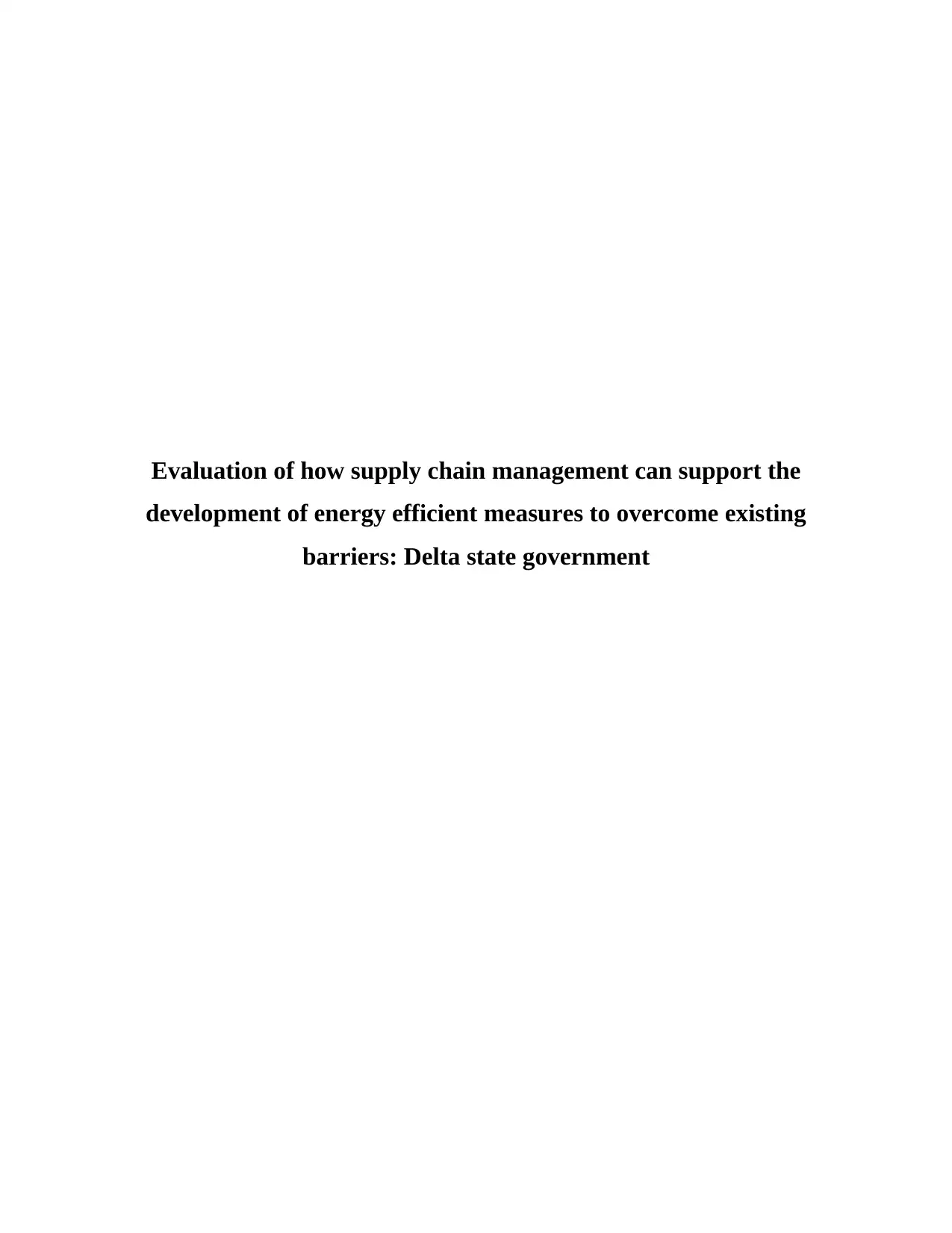
Evaluation of how supply chain management can support the
development of energy efficient measures to overcome existing
barriers: Delta state government
development of energy efficient measures to overcome existing
barriers: Delta state government
Paraphrase This Document
Need a fresh take? Get an instant paraphrase of this document with our AI Paraphraser
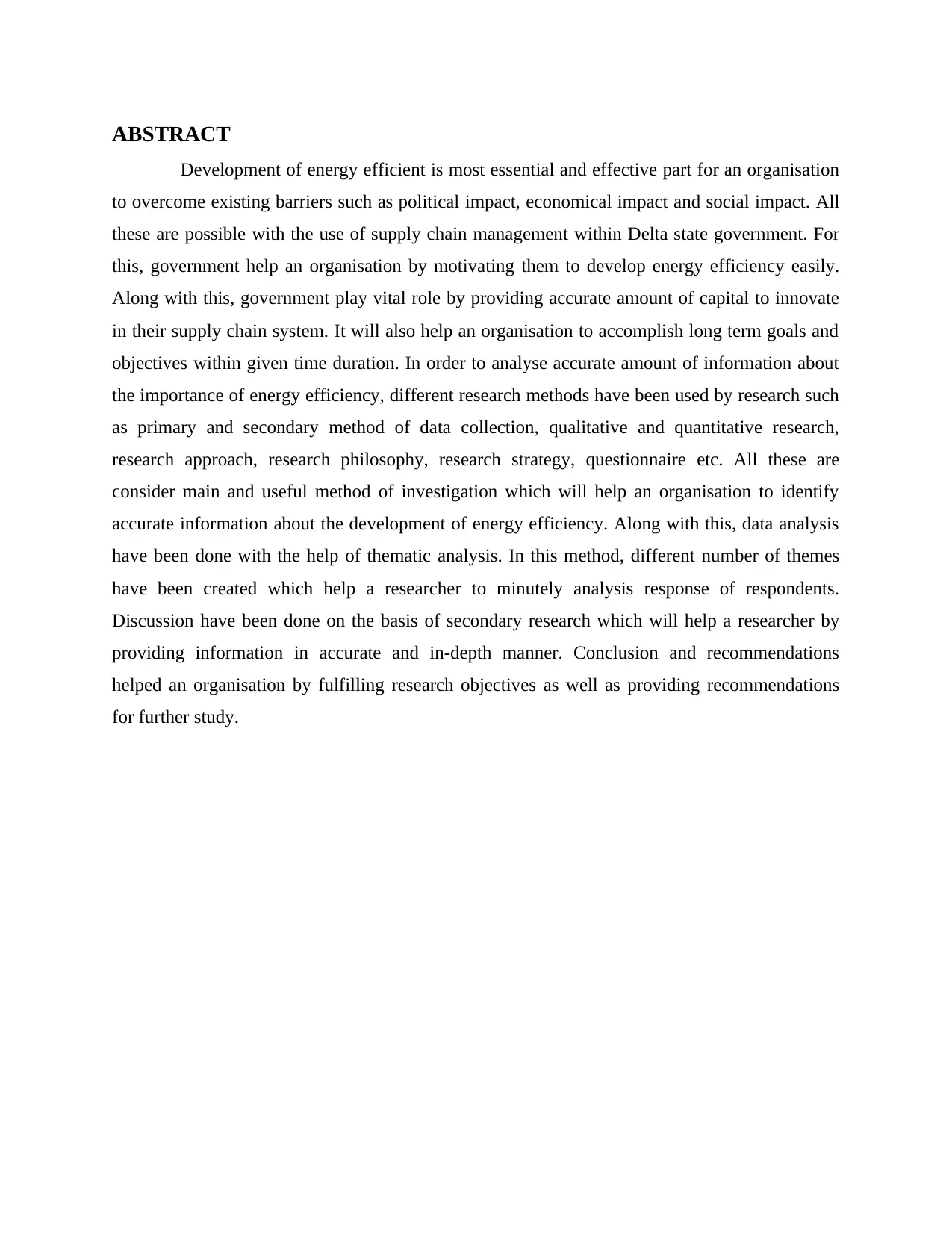
ABSTRACT
Development of energy efficient is most essential and effective part for an organisation
to overcome existing barriers such as political impact, economical impact and social impact. All
these are possible with the use of supply chain management within Delta state government. For
this, government help an organisation by motivating them to develop energy efficiency easily.
Along with this, government play vital role by providing accurate amount of capital to innovate
in their supply chain system. It will also help an organisation to accomplish long term goals and
objectives within given time duration. In order to analyse accurate amount of information about
the importance of energy efficiency, different research methods have been used by research such
as primary and secondary method of data collection, qualitative and quantitative research,
research approach, research philosophy, research strategy, questionnaire etc. All these are
consider main and useful method of investigation which will help an organisation to identify
accurate information about the development of energy efficiency. Along with this, data analysis
have been done with the help of thematic analysis. In this method, different number of themes
have been created which help a researcher to minutely analysis response of respondents.
Discussion have been done on the basis of secondary research which will help a researcher by
providing information in accurate and in-depth manner. Conclusion and recommendations
helped an organisation by fulfilling research objectives as well as providing recommendations
for further study.
Development of energy efficient is most essential and effective part for an organisation
to overcome existing barriers such as political impact, economical impact and social impact. All
these are possible with the use of supply chain management within Delta state government. For
this, government help an organisation by motivating them to develop energy efficiency easily.
Along with this, government play vital role by providing accurate amount of capital to innovate
in their supply chain system. It will also help an organisation to accomplish long term goals and
objectives within given time duration. In order to analyse accurate amount of information about
the importance of energy efficiency, different research methods have been used by research such
as primary and secondary method of data collection, qualitative and quantitative research,
research approach, research philosophy, research strategy, questionnaire etc. All these are
consider main and useful method of investigation which will help an organisation to identify
accurate information about the development of energy efficiency. Along with this, data analysis
have been done with the help of thematic analysis. In this method, different number of themes
have been created which help a researcher to minutely analysis response of respondents.
Discussion have been done on the basis of secondary research which will help a researcher by
providing information in accurate and in-depth manner. Conclusion and recommendations
helped an organisation by fulfilling research objectives as well as providing recommendations
for further study.
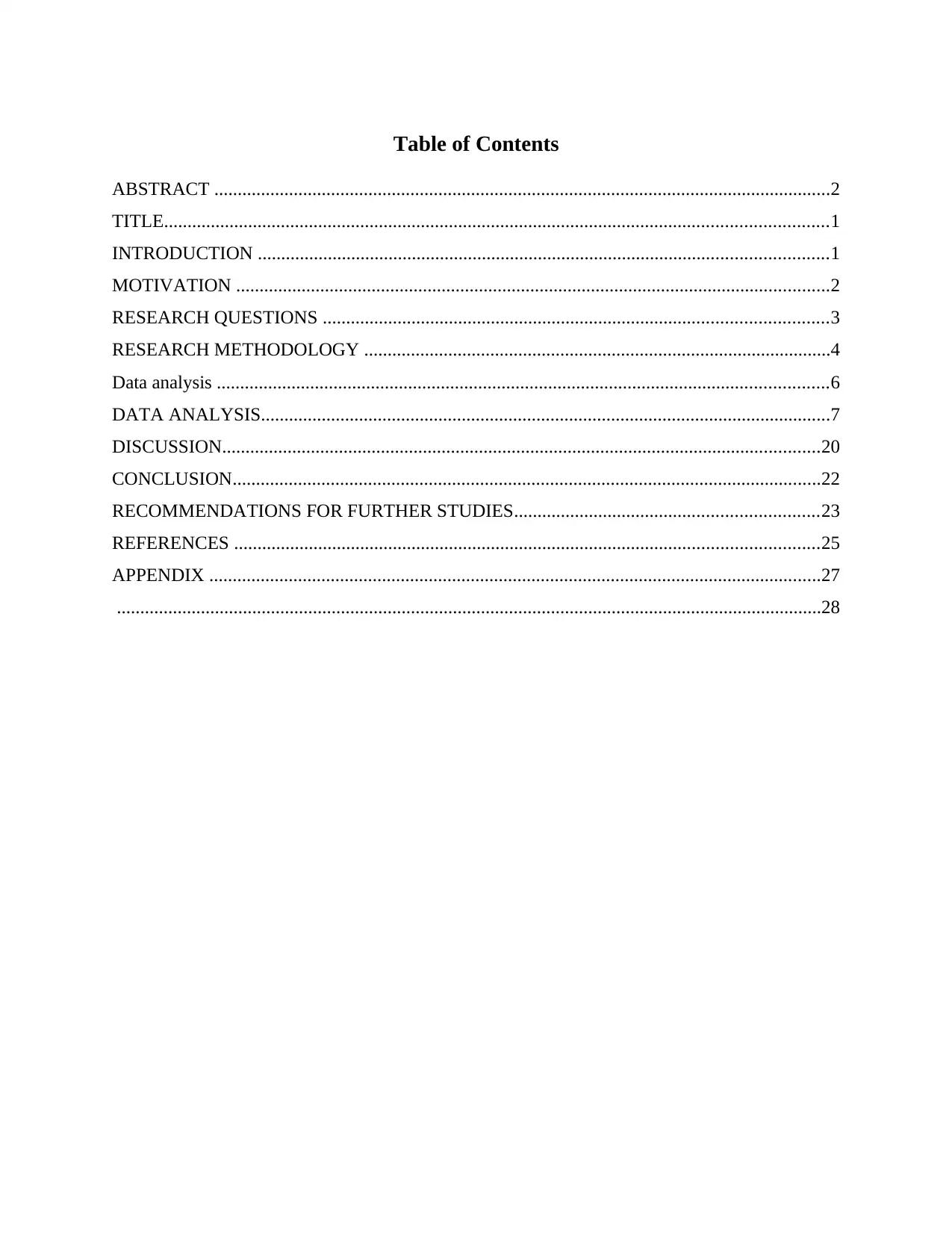
Table of Contents
ABSTRACT ....................................................................................................................................2
TITLE..............................................................................................................................................1
INTRODUCTION ..........................................................................................................................1
MOTIVATION ...............................................................................................................................2
RESEARCH QUESTIONS ............................................................................................................3
RESEARCH METHODOLOGY ....................................................................................................4
Data analysis ...................................................................................................................................6
DATA ANALYSIS..........................................................................................................................7
DISCUSSION................................................................................................................................20
CONCLUSION..............................................................................................................................22
RECOMMENDATIONS FOR FURTHER STUDIES.................................................................23
REFERENCES .............................................................................................................................25
APPENDIX ...................................................................................................................................27
.......................................................................................................................................................28
ABSTRACT ....................................................................................................................................2
TITLE..............................................................................................................................................1
INTRODUCTION ..........................................................................................................................1
MOTIVATION ...............................................................................................................................2
RESEARCH QUESTIONS ............................................................................................................3
RESEARCH METHODOLOGY ....................................................................................................4
Data analysis ...................................................................................................................................6
DATA ANALYSIS..........................................................................................................................7
DISCUSSION................................................................................................................................20
CONCLUSION..............................................................................................................................22
RECOMMENDATIONS FOR FURTHER STUDIES.................................................................23
REFERENCES .............................................................................................................................25
APPENDIX ...................................................................................................................................27
.......................................................................................................................................................28
⊘ This is a preview!⊘
Do you want full access?
Subscribe today to unlock all pages.

Trusted by 1+ million students worldwide
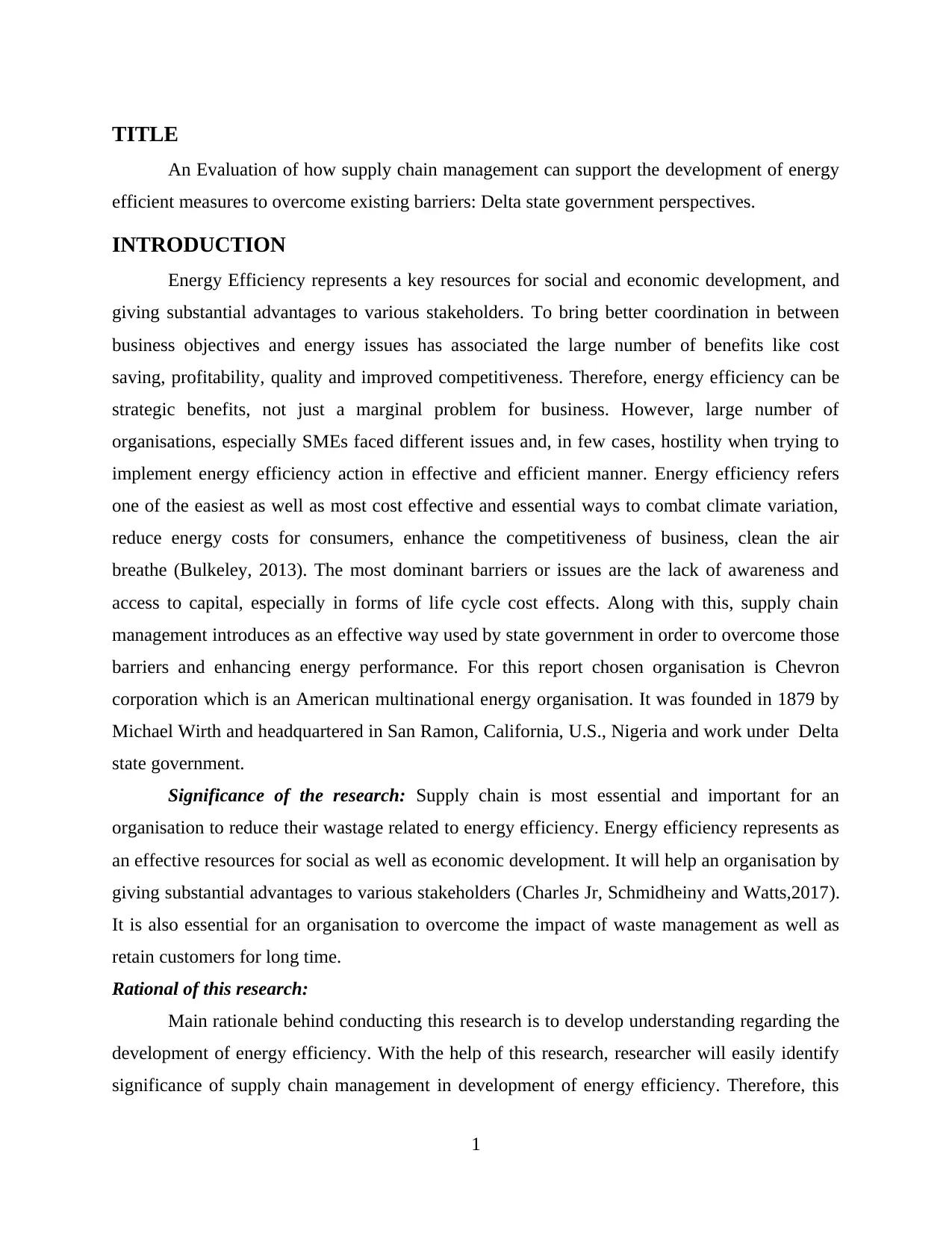
TITLE
An Evaluation of how supply chain management can support the development of energy
efficient measures to overcome existing barriers: Delta state government perspectives.
INTRODUCTION
Energy Efficiency represents a key resources for social and economic development, and
giving substantial advantages to various stakeholders. To bring better coordination in between
business objectives and energy issues has associated the large number of benefits like cost
saving, profitability, quality and improved competitiveness. Therefore, energy efficiency can be
strategic benefits, not just a marginal problem for business. However, large number of
organisations, especially SMEs faced different issues and, in few cases, hostility when trying to
implement energy efficiency action in effective and efficient manner. Energy efficiency refers
one of the easiest as well as most cost effective and essential ways to combat climate variation,
reduce energy costs for consumers, enhance the competitiveness of business, clean the air
breathe (Bulkeley, 2013). The most dominant barriers or issues are the lack of awareness and
access to capital, especially in forms of life cycle cost effects. Along with this, supply chain
management introduces as an effective way used by state government in order to overcome those
barriers and enhancing energy performance. For this report chosen organisation is Chevron
corporation which is an American multinational energy organisation. It was founded in 1879 by
Michael Wirth and headquartered in San Ramon, California, U.S., Nigeria and work under Delta
state government.
Significance of the research: Supply chain is most essential and important for an
organisation to reduce their wastage related to energy efficiency. Energy efficiency represents as
an effective resources for social as well as economic development. It will help an organisation by
giving substantial advantages to various stakeholders (Charles Jr, Schmidheiny and Watts,2017).
It is also essential for an organisation to overcome the impact of waste management as well as
retain customers for long time.
Rational of this research:
Main rationale behind conducting this research is to develop understanding regarding the
development of energy efficiency. With the help of this research, researcher will easily identify
significance of supply chain management in development of energy efficiency. Therefore, this
1
An Evaluation of how supply chain management can support the development of energy
efficient measures to overcome existing barriers: Delta state government perspectives.
INTRODUCTION
Energy Efficiency represents a key resources for social and economic development, and
giving substantial advantages to various stakeholders. To bring better coordination in between
business objectives and energy issues has associated the large number of benefits like cost
saving, profitability, quality and improved competitiveness. Therefore, energy efficiency can be
strategic benefits, not just a marginal problem for business. However, large number of
organisations, especially SMEs faced different issues and, in few cases, hostility when trying to
implement energy efficiency action in effective and efficient manner. Energy efficiency refers
one of the easiest as well as most cost effective and essential ways to combat climate variation,
reduce energy costs for consumers, enhance the competitiveness of business, clean the air
breathe (Bulkeley, 2013). The most dominant barriers or issues are the lack of awareness and
access to capital, especially in forms of life cycle cost effects. Along with this, supply chain
management introduces as an effective way used by state government in order to overcome those
barriers and enhancing energy performance. For this report chosen organisation is Chevron
corporation which is an American multinational energy organisation. It was founded in 1879 by
Michael Wirth and headquartered in San Ramon, California, U.S., Nigeria and work under Delta
state government.
Significance of the research: Supply chain is most essential and important for an
organisation to reduce their wastage related to energy efficiency. Energy efficiency represents as
an effective resources for social as well as economic development. It will help an organisation by
giving substantial advantages to various stakeholders (Charles Jr, Schmidheiny and Watts,2017).
It is also essential for an organisation to overcome the impact of waste management as well as
retain customers for long time.
Rational of this research:
Main rationale behind conducting this research is to develop understanding regarding the
development of energy efficiency. With the help of this research, researcher will easily identify
significance of supply chain management in development of energy efficiency. Therefore, this
1
Paraphrase This Document
Need a fresh take? Get an instant paraphrase of this document with our AI Paraphraser
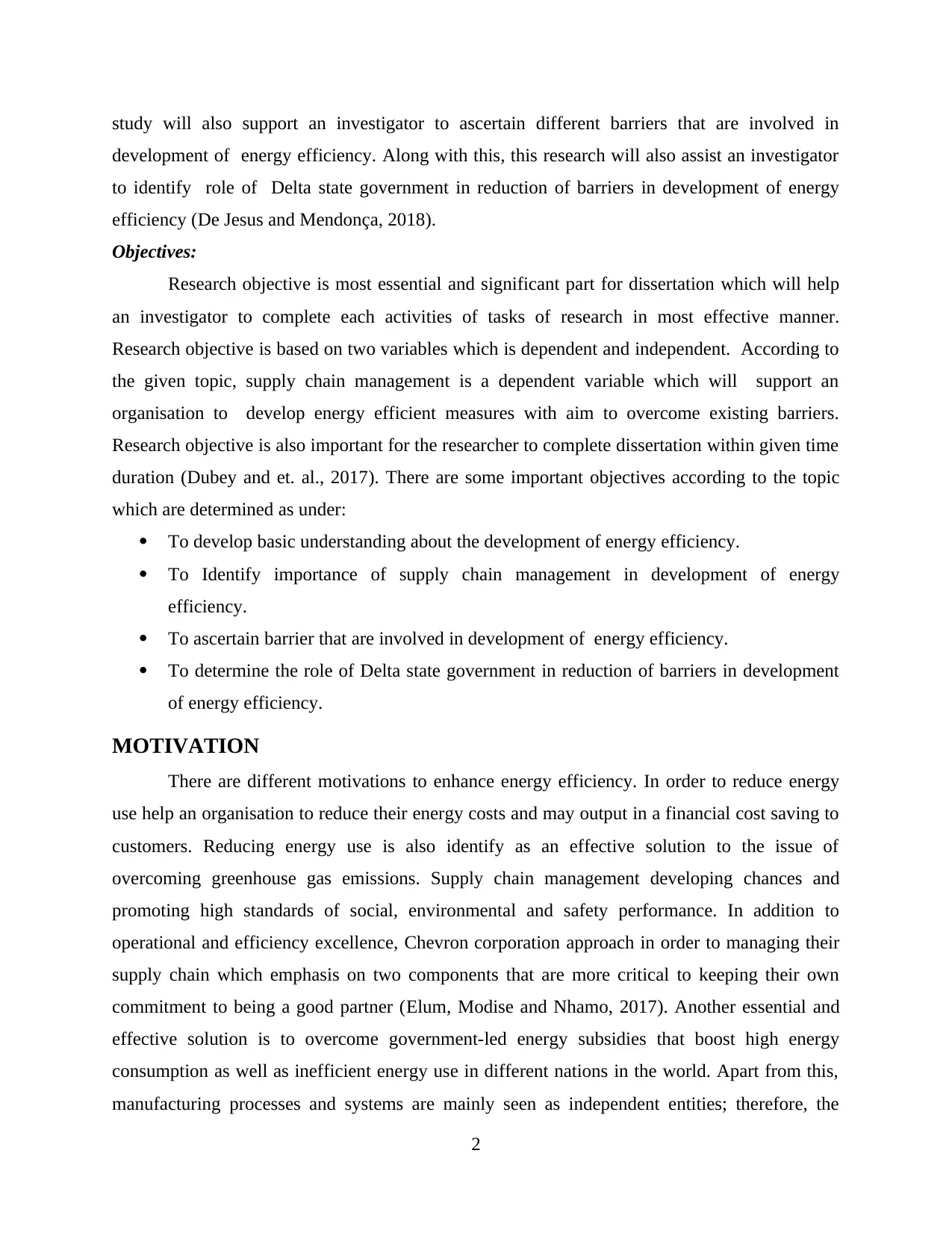
study will also support an investigator to ascertain different barriers that are involved in
development of energy efficiency. Along with this, this research will also assist an investigator
to identify role of Delta state government in reduction of barriers in development of energy
efficiency (De Jesus and Mendonça, 2018).
Objectives:
Research objective is most essential and significant part for dissertation which will help
an investigator to complete each activities of tasks of research in most effective manner.
Research objective is based on two variables which is dependent and independent. According to
the given topic, supply chain management is a dependent variable which will support an
organisation to develop energy efficient measures with aim to overcome existing barriers.
Research objective is also important for the researcher to complete dissertation within given time
duration (Dubey and et. al., 2017). There are some important objectives according to the topic
which are determined as under:
To develop basic understanding about the development of energy efficiency.
To Identify importance of supply chain management in development of energy
efficiency.
To ascertain barrier that are involved in development of energy efficiency.
To determine the role of Delta state government in reduction of barriers in development
of energy efficiency.
MOTIVATION
There are different motivations to enhance energy efficiency. In order to reduce energy
use help an organisation to reduce their energy costs and may output in a financial cost saving to
customers. Reducing energy use is also identify as an effective solution to the issue of
overcoming greenhouse gas emissions. Supply chain management developing chances and
promoting high standards of social, environmental and safety performance. In addition to
operational and efficiency excellence, Chevron corporation approach in order to managing their
supply chain which emphasis on two components that are more critical to keeping their own
commitment to being a good partner (Elum, Modise and Nhamo, 2017). Another essential and
effective solution is to overcome government-led energy subsidies that boost high energy
consumption as well as inefficient energy use in different nations in the world. Apart from this,
manufacturing processes and systems are mainly seen as independent entities; therefore, the
2
development of energy efficiency. Along with this, this research will also assist an investigator
to identify role of Delta state government in reduction of barriers in development of energy
efficiency (De Jesus and Mendonça, 2018).
Objectives:
Research objective is most essential and significant part for dissertation which will help
an investigator to complete each activities of tasks of research in most effective manner.
Research objective is based on two variables which is dependent and independent. According to
the given topic, supply chain management is a dependent variable which will support an
organisation to develop energy efficient measures with aim to overcome existing barriers.
Research objective is also important for the researcher to complete dissertation within given time
duration (Dubey and et. al., 2017). There are some important objectives according to the topic
which are determined as under:
To develop basic understanding about the development of energy efficiency.
To Identify importance of supply chain management in development of energy
efficiency.
To ascertain barrier that are involved in development of energy efficiency.
To determine the role of Delta state government in reduction of barriers in development
of energy efficiency.
MOTIVATION
There are different motivations to enhance energy efficiency. In order to reduce energy
use help an organisation to reduce their energy costs and may output in a financial cost saving to
customers. Reducing energy use is also identify as an effective solution to the issue of
overcoming greenhouse gas emissions. Supply chain management developing chances and
promoting high standards of social, environmental and safety performance. In addition to
operational and efficiency excellence, Chevron corporation approach in order to managing their
supply chain which emphasis on two components that are more critical to keeping their own
commitment to being a good partner (Elum, Modise and Nhamo, 2017). Another essential and
effective solution is to overcome government-led energy subsidies that boost high energy
consumption as well as inefficient energy use in different nations in the world. Apart from this,
manufacturing processes and systems are mainly seen as independent entities; therefore, the
2
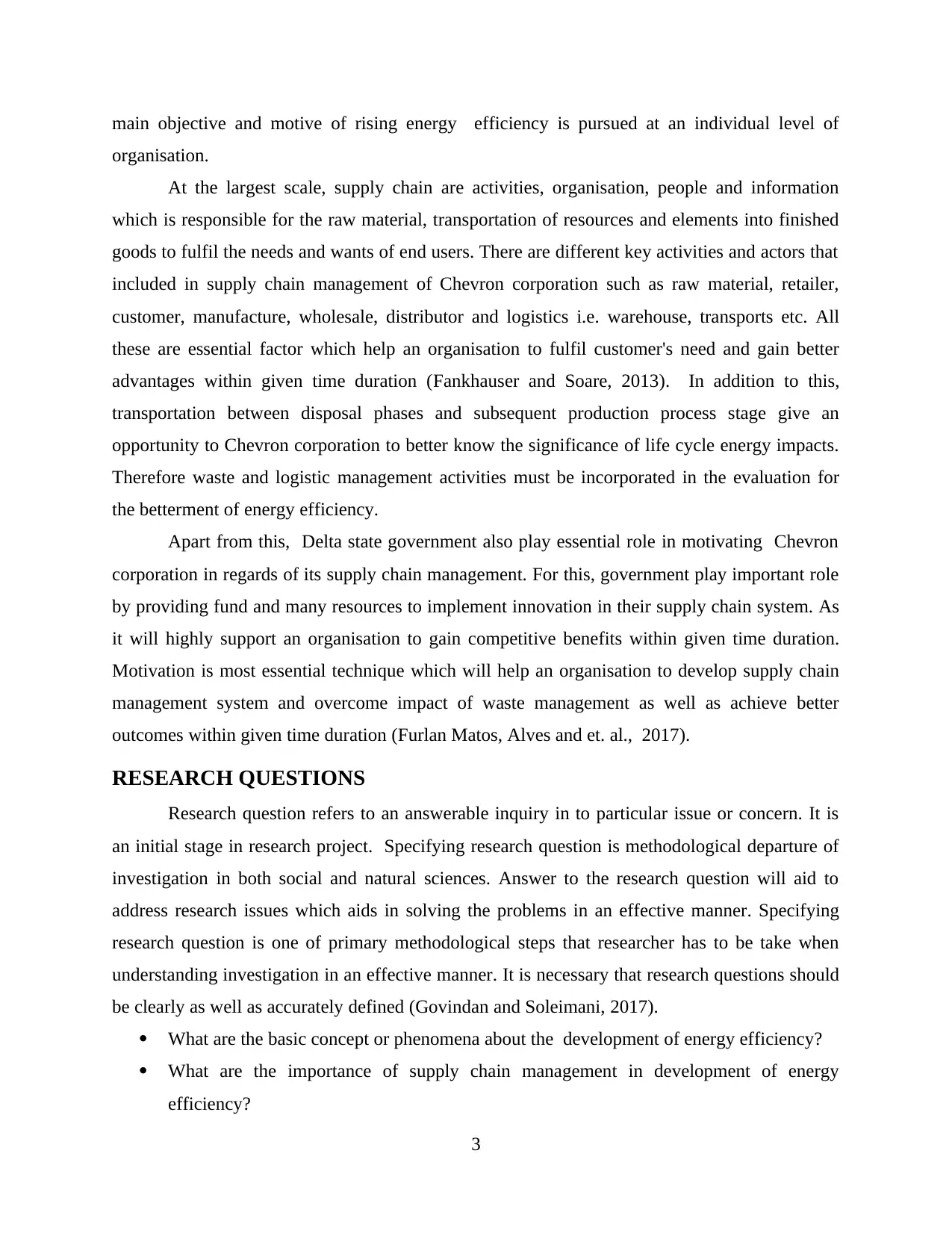
main objective and motive of rising energy efficiency is pursued at an individual level of
organisation.
At the largest scale, supply chain are activities, organisation, people and information
which is responsible for the raw material, transportation of resources and elements into finished
goods to fulfil the needs and wants of end users. There are different key activities and actors that
included in supply chain management of Chevron corporation such as raw material, retailer,
customer, manufacture, wholesale, distributor and logistics i.e. warehouse, transports etc. All
these are essential factor which help an organisation to fulfil customer's need and gain better
advantages within given time duration (Fankhauser and Soare, 2013). In addition to this,
transportation between disposal phases and subsequent production process stage give an
opportunity to Chevron corporation to better know the significance of life cycle energy impacts.
Therefore waste and logistic management activities must be incorporated in the evaluation for
the betterment of energy efficiency.
Apart from this, Delta state government also play essential role in motivating Chevron
corporation in regards of its supply chain management. For this, government play important role
by providing fund and many resources to implement innovation in their supply chain system. As
it will highly support an organisation to gain competitive benefits within given time duration.
Motivation is most essential technique which will help an organisation to develop supply chain
management system and overcome impact of waste management as well as achieve better
outcomes within given time duration (Furlan Matos, Alves and et. al., 2017).
RESEARCH QUESTIONS
Research question refers to an answerable inquiry in to particular issue or concern. It is
an initial stage in research project. Specifying research question is methodological departure of
investigation in both social and natural sciences. Answer to the research question will aid to
address research issues which aids in solving the problems in an effective manner. Specifying
research question is one of primary methodological steps that researcher has to be take when
understanding investigation in an effective manner. It is necessary that research questions should
be clearly as well as accurately defined (Govindan and Soleimani, 2017).
What are the basic concept or phenomena about the development of energy efficiency?
What are the importance of supply chain management in development of energy
efficiency?
3
organisation.
At the largest scale, supply chain are activities, organisation, people and information
which is responsible for the raw material, transportation of resources and elements into finished
goods to fulfil the needs and wants of end users. There are different key activities and actors that
included in supply chain management of Chevron corporation such as raw material, retailer,
customer, manufacture, wholesale, distributor and logistics i.e. warehouse, transports etc. All
these are essential factor which help an organisation to fulfil customer's need and gain better
advantages within given time duration (Fankhauser and Soare, 2013). In addition to this,
transportation between disposal phases and subsequent production process stage give an
opportunity to Chevron corporation to better know the significance of life cycle energy impacts.
Therefore waste and logistic management activities must be incorporated in the evaluation for
the betterment of energy efficiency.
Apart from this, Delta state government also play essential role in motivating Chevron
corporation in regards of its supply chain management. For this, government play important role
by providing fund and many resources to implement innovation in their supply chain system. As
it will highly support an organisation to gain competitive benefits within given time duration.
Motivation is most essential technique which will help an organisation to develop supply chain
management system and overcome impact of waste management as well as achieve better
outcomes within given time duration (Furlan Matos, Alves and et. al., 2017).
RESEARCH QUESTIONS
Research question refers to an answerable inquiry in to particular issue or concern. It is
an initial stage in research project. Specifying research question is methodological departure of
investigation in both social and natural sciences. Answer to the research question will aid to
address research issues which aids in solving the problems in an effective manner. Specifying
research question is one of primary methodological steps that researcher has to be take when
understanding investigation in an effective manner. It is necessary that research questions should
be clearly as well as accurately defined (Govindan and Soleimani, 2017).
What are the basic concept or phenomena about the development of energy efficiency?
What are the importance of supply chain management in development of energy
efficiency?
3
⊘ This is a preview!⊘
Do you want full access?
Subscribe today to unlock all pages.

Trusted by 1+ million students worldwide
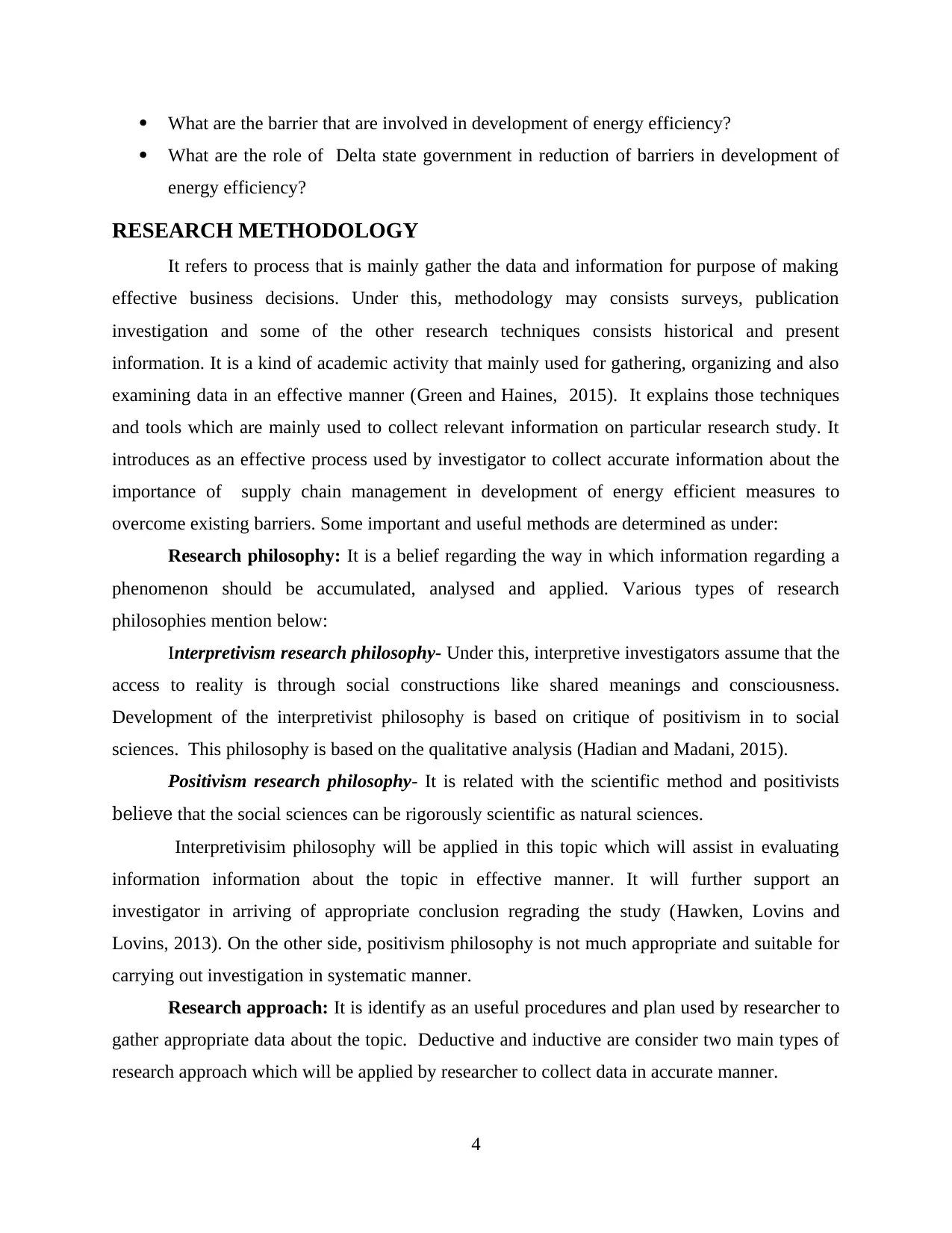
What are the barrier that are involved in development of energy efficiency?
What are the role of Delta state government in reduction of barriers in development of
energy efficiency?
RESEARCH METHODOLOGY
It refers to process that is mainly gather the data and information for purpose of making
effective business decisions. Under this, methodology may consists surveys, publication
investigation and some of the other research techniques consists historical and present
information. It is a kind of academic activity that mainly used for gathering, organizing and also
examining data in an effective manner (Green and Haines, 2015). It explains those techniques
and tools which are mainly used to collect relevant information on particular research study. It
introduces as an effective process used by investigator to collect accurate information about the
importance of supply chain management in development of energy efficient measures to
overcome existing barriers. Some important and useful methods are determined as under:
Research philosophy: It is a belief regarding the way in which information regarding a
phenomenon should be accumulated, analysed and applied. Various types of research
philosophies mention below:
Interpretivism research philosophy- Under this, interpretive investigators assume that the
access to reality is through social constructions like shared meanings and consciousness.
Development of the interpretivist philosophy is based on critique of positivism in to social
sciences. This philosophy is based on the qualitative analysis (Hadian and Madani, 2015).
Positivism research philosophy- It is related with the scientific method and positivists
believe that the social sciences can be rigorously scientific as natural sciences.
Interpretivisim philosophy will be applied in this topic which will assist in evaluating
information information about the topic in effective manner. It will further support an
investigator in arriving of appropriate conclusion regrading the study (Hawken, Lovins and
Lovins, 2013). On the other side, positivism philosophy is not much appropriate and suitable for
carrying out investigation in systematic manner.
Research approach: It is identify as an useful procedures and plan used by researcher to
gather appropriate data about the topic. Deductive and inductive are consider two main types of
research approach which will be applied by researcher to collect data in accurate manner.
4
What are the role of Delta state government in reduction of barriers in development of
energy efficiency?
RESEARCH METHODOLOGY
It refers to process that is mainly gather the data and information for purpose of making
effective business decisions. Under this, methodology may consists surveys, publication
investigation and some of the other research techniques consists historical and present
information. It is a kind of academic activity that mainly used for gathering, organizing and also
examining data in an effective manner (Green and Haines, 2015). It explains those techniques
and tools which are mainly used to collect relevant information on particular research study. It
introduces as an effective process used by investigator to collect accurate information about the
importance of supply chain management in development of energy efficient measures to
overcome existing barriers. Some important and useful methods are determined as under:
Research philosophy: It is a belief regarding the way in which information regarding a
phenomenon should be accumulated, analysed and applied. Various types of research
philosophies mention below:
Interpretivism research philosophy- Under this, interpretive investigators assume that the
access to reality is through social constructions like shared meanings and consciousness.
Development of the interpretivist philosophy is based on critique of positivism in to social
sciences. This philosophy is based on the qualitative analysis (Hadian and Madani, 2015).
Positivism research philosophy- It is related with the scientific method and positivists
believe that the social sciences can be rigorously scientific as natural sciences.
Interpretivisim philosophy will be applied in this topic which will assist in evaluating
information information about the topic in effective manner. It will further support an
investigator in arriving of appropriate conclusion regrading the study (Hawken, Lovins and
Lovins, 2013). On the other side, positivism philosophy is not much appropriate and suitable for
carrying out investigation in systematic manner.
Research approach: It is identify as an useful procedures and plan used by researcher to
gather appropriate data about the topic. Deductive and inductive are consider two main types of
research approach which will be applied by researcher to collect data in accurate manner.
4
Paraphrase This Document
Need a fresh take? Get an instant paraphrase of this document with our AI Paraphraser
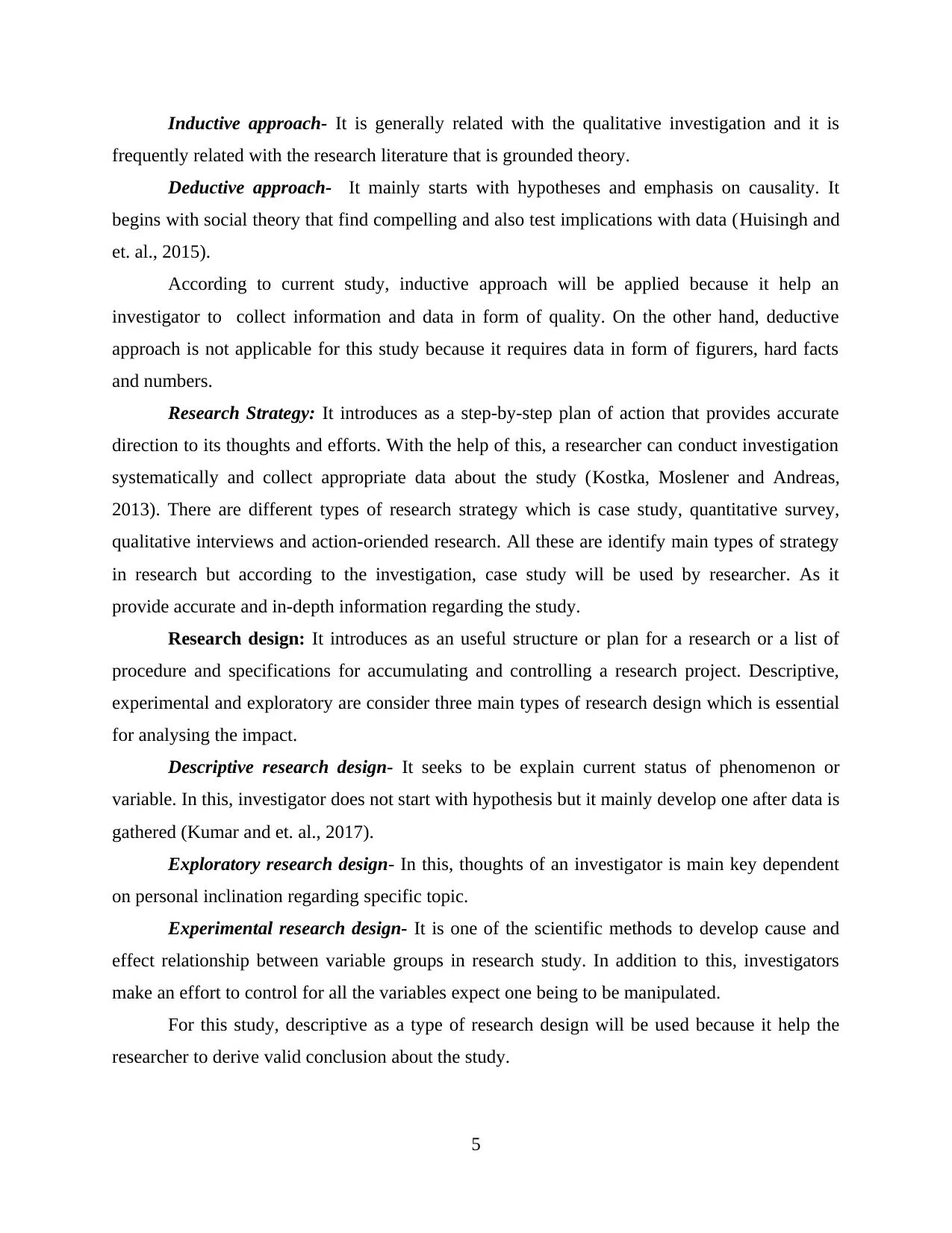
Inductive approach- It is generally related with the qualitative investigation and it is
frequently related with the research literature that is grounded theory.
Deductive approach- It mainly starts with hypotheses and emphasis on causality. It
begins with social theory that find compelling and also test implications with data (Huisingh and
et. al., 2015).
According to current study, inductive approach will be applied because it help an
investigator to collect information and data in form of quality. On the other hand, deductive
approach is not applicable for this study because it requires data in form of figurers, hard facts
and numbers.
Research Strategy: It introduces as a step-by-step plan of action that provides accurate
direction to its thoughts and efforts. With the help of this, a researcher can conduct investigation
systematically and collect appropriate data about the study (Kostka, Moslener and Andreas,
2013). There are different types of research strategy which is case study, quantitative survey,
qualitative interviews and action-oriended research. All these are identify main types of strategy
in research but according to the investigation, case study will be used by researcher. As it
provide accurate and in-depth information regarding the study.
Research design: It introduces as an useful structure or plan for a research or a list of
procedure and specifications for accumulating and controlling a research project. Descriptive,
experimental and exploratory are consider three main types of research design which is essential
for analysing the impact.
Descriptive research design- It seeks to be explain current status of phenomenon or
variable. In this, investigator does not start with hypothesis but it mainly develop one after data is
gathered (Kumar and et. al., 2017).
Exploratory research design- In this, thoughts of an investigator is main key dependent
on personal inclination regarding specific topic.
Experimental research design- It is one of the scientific methods to develop cause and
effect relationship between variable groups in research study. In addition to this, investigators
make an effort to control for all the variables expect one being to be manipulated.
For this study, descriptive as a type of research design will be used because it help the
researcher to derive valid conclusion about the study.
5
frequently related with the research literature that is grounded theory.
Deductive approach- It mainly starts with hypotheses and emphasis on causality. It
begins with social theory that find compelling and also test implications with data (Huisingh and
et. al., 2015).
According to current study, inductive approach will be applied because it help an
investigator to collect information and data in form of quality. On the other hand, deductive
approach is not applicable for this study because it requires data in form of figurers, hard facts
and numbers.
Research Strategy: It introduces as a step-by-step plan of action that provides accurate
direction to its thoughts and efforts. With the help of this, a researcher can conduct investigation
systematically and collect appropriate data about the study (Kostka, Moslener and Andreas,
2013). There are different types of research strategy which is case study, quantitative survey,
qualitative interviews and action-oriended research. All these are identify main types of strategy
in research but according to the investigation, case study will be used by researcher. As it
provide accurate and in-depth information regarding the study.
Research design: It introduces as an useful structure or plan for a research or a list of
procedure and specifications for accumulating and controlling a research project. Descriptive,
experimental and exploratory are consider three main types of research design which is essential
for analysing the impact.
Descriptive research design- It seeks to be explain current status of phenomenon or
variable. In this, investigator does not start with hypothesis but it mainly develop one after data is
gathered (Kumar and et. al., 2017).
Exploratory research design- In this, thoughts of an investigator is main key dependent
on personal inclination regarding specific topic.
Experimental research design- It is one of the scientific methods to develop cause and
effect relationship between variable groups in research study. In addition to this, investigators
make an effort to control for all the variables expect one being to be manipulated.
For this study, descriptive as a type of research design will be used because it help the
researcher to derive valid conclusion about the study.
5
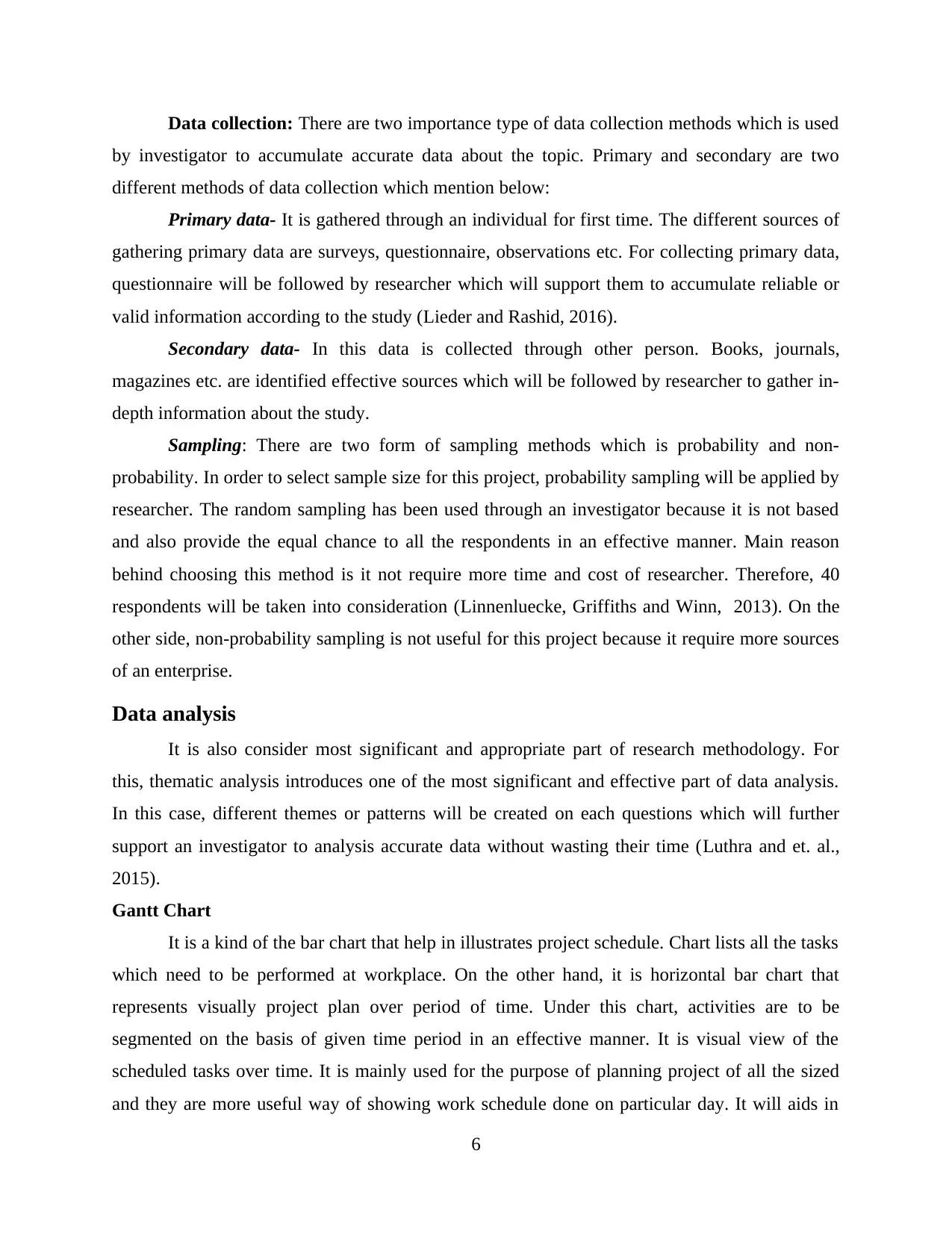
Data collection: There are two importance type of data collection methods which is used
by investigator to accumulate accurate data about the topic. Primary and secondary are two
different methods of data collection which mention below:
Primary data- It is gathered through an individual for first time. The different sources of
gathering primary data are surveys, questionnaire, observations etc. For collecting primary data,
questionnaire will be followed by researcher which will support them to accumulate reliable or
valid information according to the study (Lieder and Rashid, 2016).
Secondary data- In this data is collected through other person. Books, journals,
magazines etc. are identified effective sources which will be followed by researcher to gather in-
depth information about the study.
Sampling: There are two form of sampling methods which is probability and non-
probability. In order to select sample size for this project, probability sampling will be applied by
researcher. The random sampling has been used through an investigator because it is not based
and also provide the equal chance to all the respondents in an effective manner. Main reason
behind choosing this method is it not require more time and cost of researcher. Therefore, 40
respondents will be taken into consideration (Linnenluecke, Griffiths and Winn, 2013). On the
other side, non-probability sampling is not useful for this project because it require more sources
of an enterprise.
Data analysis
It is also consider most significant and appropriate part of research methodology. For
this, thematic analysis introduces one of the most significant and effective part of data analysis.
In this case, different themes or patterns will be created on each questions which will further
support an investigator to analysis accurate data without wasting their time (Luthra and et. al.,
2015).
Gantt Chart
It is a kind of the bar chart that help in illustrates project schedule. Chart lists all the tasks
which need to be performed at workplace. On the other hand, it is horizontal bar chart that
represents visually project plan over period of time. Under this chart, activities are to be
segmented on the basis of given time period in an effective manner. It is visual view of the
scheduled tasks over time. It is mainly used for the purpose of planning project of all the sized
and they are more useful way of showing work schedule done on particular day. It will aids in
6
by investigator to accumulate accurate data about the topic. Primary and secondary are two
different methods of data collection which mention below:
Primary data- It is gathered through an individual for first time. The different sources of
gathering primary data are surveys, questionnaire, observations etc. For collecting primary data,
questionnaire will be followed by researcher which will support them to accumulate reliable or
valid information according to the study (Lieder and Rashid, 2016).
Secondary data- In this data is collected through other person. Books, journals,
magazines etc. are identified effective sources which will be followed by researcher to gather in-
depth information about the study.
Sampling: There are two form of sampling methods which is probability and non-
probability. In order to select sample size for this project, probability sampling will be applied by
researcher. The random sampling has been used through an investigator because it is not based
and also provide the equal chance to all the respondents in an effective manner. Main reason
behind choosing this method is it not require more time and cost of researcher. Therefore, 40
respondents will be taken into consideration (Linnenluecke, Griffiths and Winn, 2013). On the
other side, non-probability sampling is not useful for this project because it require more sources
of an enterprise.
Data analysis
It is also consider most significant and appropriate part of research methodology. For
this, thematic analysis introduces one of the most significant and effective part of data analysis.
In this case, different themes or patterns will be created on each questions which will further
support an investigator to analysis accurate data without wasting their time (Luthra and et. al.,
2015).
Gantt Chart
It is a kind of the bar chart that help in illustrates project schedule. Chart lists all the tasks
which need to be performed at workplace. On the other hand, it is horizontal bar chart that
represents visually project plan over period of time. Under this chart, activities are to be
segmented on the basis of given time period in an effective manner. It is visual view of the
scheduled tasks over time. It is mainly used for the purpose of planning project of all the sized
and they are more useful way of showing work schedule done on particular day. It will aids in
6
⊘ This is a preview!⊘
Do you want full access?
Subscribe today to unlock all pages.

Trusted by 1+ million students worldwide
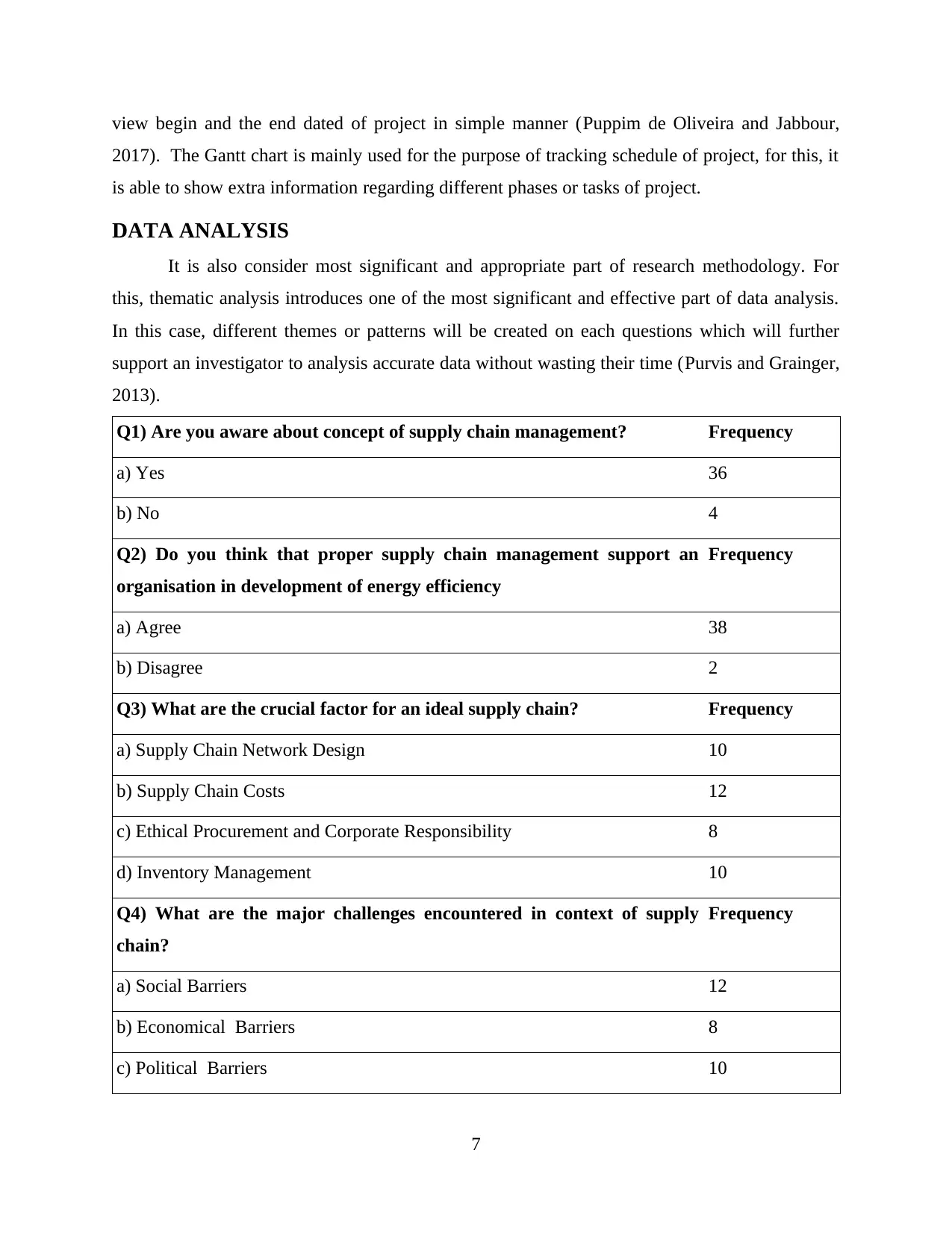
view begin and the end dated of project in simple manner (Puppim de Oliveira and Jabbour,
2017). The Gantt chart is mainly used for the purpose of tracking schedule of project, for this, it
is able to show extra information regarding different phases or tasks of project.
DATA ANALYSIS
It is also consider most significant and appropriate part of research methodology. For
this, thematic analysis introduces one of the most significant and effective part of data analysis.
In this case, different themes or patterns will be created on each questions which will further
support an investigator to analysis accurate data without wasting their time (Purvis and Grainger,
2013).
Q1) Are you aware about concept of supply chain management? Frequency
a) Yes 36
b) No 4
Q2) Do you think that proper supply chain management support an
organisation in development of energy efficiency
Frequency
a) Agree 38
b) Disagree 2
Q3) What are the crucial factor for an ideal supply chain? Frequency
a) Supply Chain Network Design 10
b) Supply Chain Costs 12
c) Ethical Procurement and Corporate Responsibility 8
d) Inventory Management 10
Q4) What are the major challenges encountered in context of supply
chain?
Frequency
a) Social Barriers 12
b) Economical Barriers 8
c) Political Barriers 10
7
2017). The Gantt chart is mainly used for the purpose of tracking schedule of project, for this, it
is able to show extra information regarding different phases or tasks of project.
DATA ANALYSIS
It is also consider most significant and appropriate part of research methodology. For
this, thematic analysis introduces one of the most significant and effective part of data analysis.
In this case, different themes or patterns will be created on each questions which will further
support an investigator to analysis accurate data without wasting their time (Purvis and Grainger,
2013).
Q1) Are you aware about concept of supply chain management? Frequency
a) Yes 36
b) No 4
Q2) Do you think that proper supply chain management support an
organisation in development of energy efficiency
Frequency
a) Agree 38
b) Disagree 2
Q3) What are the crucial factor for an ideal supply chain? Frequency
a) Supply Chain Network Design 10
b) Supply Chain Costs 12
c) Ethical Procurement and Corporate Responsibility 8
d) Inventory Management 10
Q4) What are the major challenges encountered in context of supply
chain?
Frequency
a) Social Barriers 12
b) Economical Barriers 8
c) Political Barriers 10
7
Paraphrase This Document
Need a fresh take? Get an instant paraphrase of this document with our AI Paraphraser
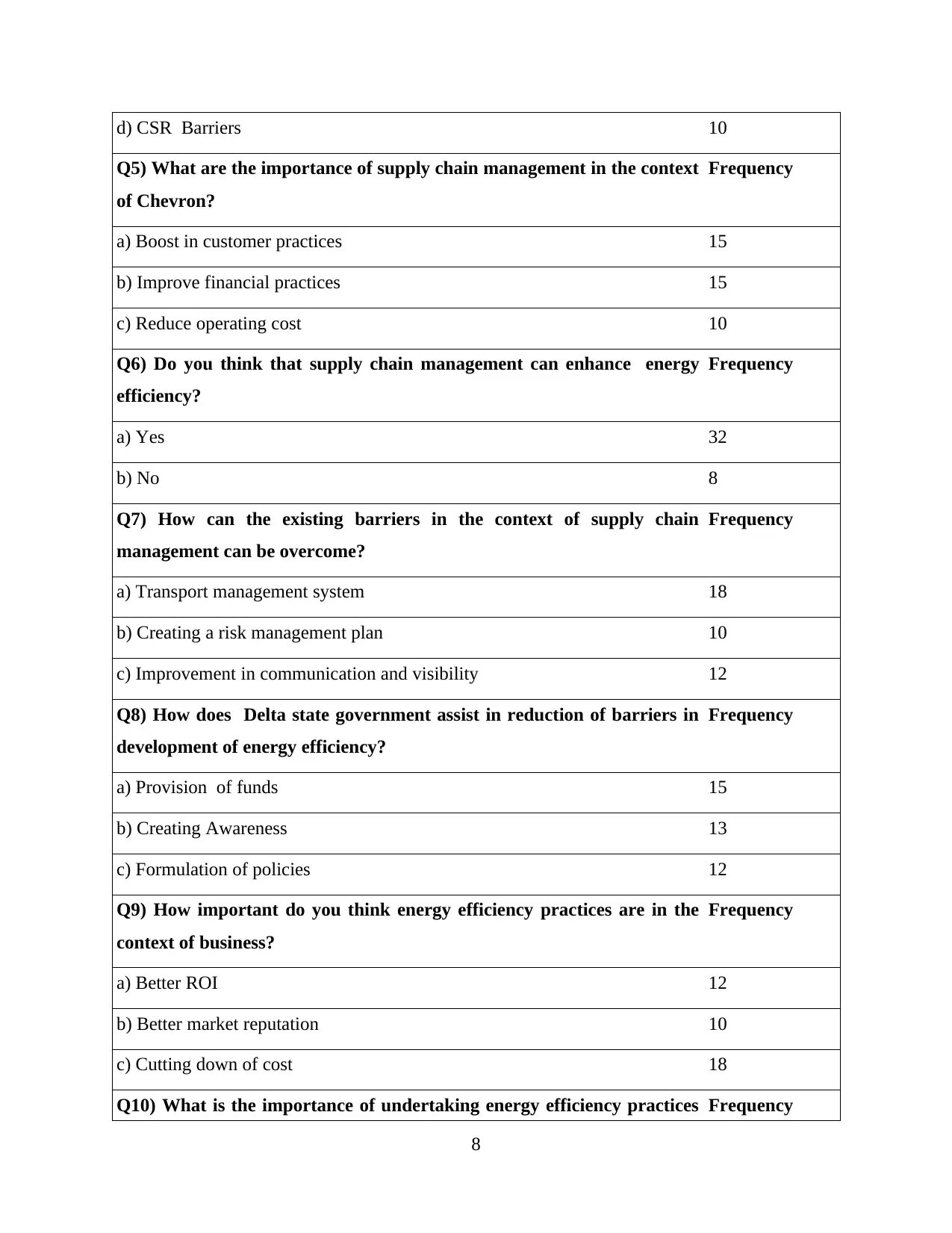
d) CSR Barriers 10
Q5) What are the importance of supply chain management in the context
of Chevron?
Frequency
a) Boost in customer practices 15
b) Improve financial practices 15
c) Reduce operating cost 10
Q6) Do you think that supply chain management can enhance energy
efficiency?
Frequency
a) Yes 32
b) No 8
Q7) How can the existing barriers in the context of supply chain
management can be overcome?
Frequency
a) Transport management system 18
b) Creating a risk management plan 10
c) Improvement in communication and visibility 12
Q8) How does Delta state government assist in reduction of barriers in
development of energy efficiency?
Frequency
a) Provision of funds 15
b) Creating Awareness 13
c) Formulation of policies 12
Q9) How important do you think energy efficiency practices are in the
context of business?
Frequency
a) Better ROI 12
b) Better market reputation 10
c) Cutting down of cost 18
Q10) What is the importance of undertaking energy efficiency practices Frequency
8
Q5) What are the importance of supply chain management in the context
of Chevron?
Frequency
a) Boost in customer practices 15
b) Improve financial practices 15
c) Reduce operating cost 10
Q6) Do you think that supply chain management can enhance energy
efficiency?
Frequency
a) Yes 32
b) No 8
Q7) How can the existing barriers in the context of supply chain
management can be overcome?
Frequency
a) Transport management system 18
b) Creating a risk management plan 10
c) Improvement in communication and visibility 12
Q8) How does Delta state government assist in reduction of barriers in
development of energy efficiency?
Frequency
a) Provision of funds 15
b) Creating Awareness 13
c) Formulation of policies 12
Q9) How important do you think energy efficiency practices are in the
context of business?
Frequency
a) Better ROI 12
b) Better market reputation 10
c) Cutting down of cost 18
Q10) What is the importance of undertaking energy efficiency practices Frequency
8

in supply chain management?
a) Smooth functioning of operations 15
b) Better transpiration facilities 10
c) Quick service delivery 15
9
a) Smooth functioning of operations 15
b) Better transpiration facilities 10
c) Quick service delivery 15
9
⊘ This is a preview!⊘
Do you want full access?
Subscribe today to unlock all pages.

Trusted by 1+ million students worldwide
1 out of 34
Related Documents
Your All-in-One AI-Powered Toolkit for Academic Success.
+13062052269
info@desklib.com
Available 24*7 on WhatsApp / Email
![[object Object]](/_next/static/media/star-bottom.7253800d.svg)
Unlock your academic potential
Copyright © 2020–2026 A2Z Services. All Rights Reserved. Developed and managed by ZUCOL.





